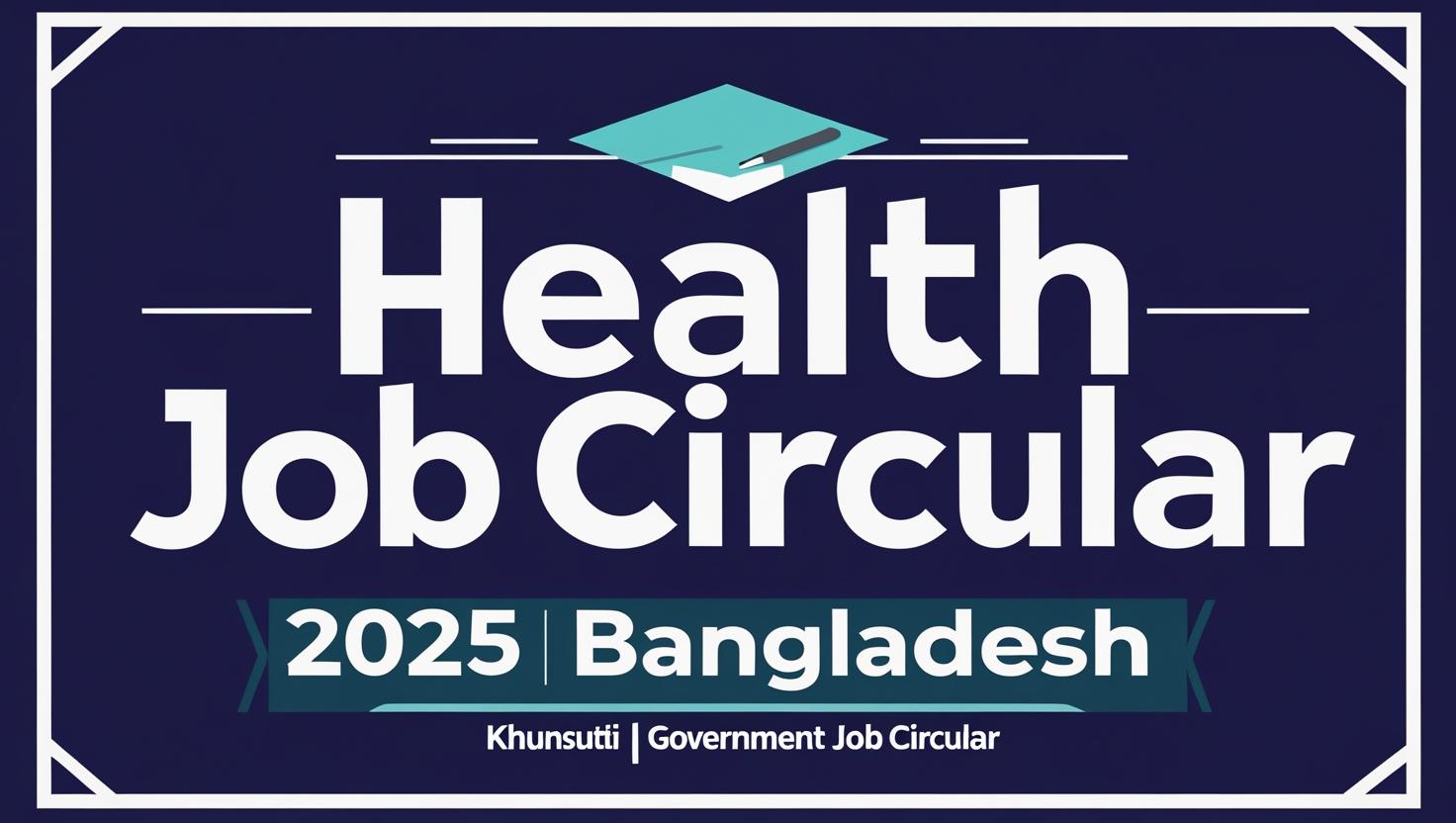The health sector in Bangladesh continues to grow rapidly, offering numerous job opportunities. As the year 2025 approaches, various health job circulars are being released, presenting promising prospects for both fresh graduates and experienced professionals. If you’re seeking a career in healthcare, now is the time to explore these openings.
As employment opportunities in the health sector expand, a wide range of positions is being advertised. This includes roles in public health, nursing, medical technology, and administrative support. Here are some of the main job categories likely to be featured in the health job circulars of 2025:
- Doctors and Specialists
- Nurses and Midwives
- Pharmacists
- Medical Technologists
- Health Administrators
Additionally, the circulars may highlight positions in health-related NGOs and research organizations. These roles can often provide competitive salaries and benefits, making them attractive options for job seekers.
Eligibility Criteria
To apply for positions listed in the health job circulars, you’ll need to meet specific eligibility criteria. These may vary by position, but generally include:
- A relevant degree or diploma from a recognized institution.
- Required licenses or certifications, particularly for medical professionals.
- Work experience may be preferred for some positions, especially in administrative roles.
- Strong communication and interpersonal skills.
Stay informed and prepare your application accordingly to enhance your chances of landing your desired job.
Where to Find Job Circulars
Job seekers can access the latest health job circulars through various platforms. The government and private organizations frequently update their websites with jobs in the health sector. Some trusted sources include:
Following these sources will help you stay up-to-date on new postings, deadlines, and specific application procedures.
Application Process
Submitting your application is a crucial step in your job search. Here’s a simple outline of the typical application process:
- Review the job circular carefully for details on position requirements and application deadlines.
- Gather all necessary documents, including your resume, cover letter, and any relevant certificates.
- Submit your application via the specified method, whether online or by postal service.
- Prepare for interviews by researching commonly asked questions and practicing your responses.
Tailor your resume and cover letter to each specific role to highlight your qualifications and experience relevant to the job.
Benefits of Working in the Health Sector
Choosing a career in healthcare in Bangladesh can be incredibly rewarding. Here are some benefits associated with working in this sector:
- Job Security: The demand for healthcare professionals is consistently rising, providing job security.
- Opportunities for Growth: There are numerous avenues for specialization and advancement within the health field.
- Impact on Society: Working in healthcare enables you to positively impact the health and well-being of individuals and communities.
- Competitive Salaries: Many positions in the health sector offer competitive compensation and benefits.
As 2025 approaches, the health job circulars will provide an avenue for many eager professionals to join this fulfilling field. Make sure to keep an eye on the latest postings, polish your application materials, and prepare well for interviews. The future is bright for those looking to work in health-related professions in Bangladesh.
Key Qualifications Needed for Health Sector Jobs in Bangladesh
Bangladesh’s health sector is experiencing significant growth and modernization, leading to a surge in job opportunities. For job seekers aspiring to work in this sector, understanding the key qualifications required is essential to enhance employability and thrive in health-related positions.
Educational Requirements
One of the primary qualifications for health sector jobs in Bangladesh is a relevant educational background. Here are some common educational qualifications needed:
- Bachelor’s Degree: A bachelor’s degree in medicine, nursing, pharmacy, public health, or allied health sciences is often essential.
- Master’s Degree: Higher positions may require a master’s degree in fields such as health administration, public health, or healthcare management.
- Professional Certifications: Specific roles like nursing or pharmacology may require additional certification or licensure, ensuring professional competence.
Experience in the Field
Work experience is another critical aspect. Employers often look for candidates who have:
- Internships or Practicums: Hands-on experience gained through internships during education greatly enhances a candidate’s profile.
- Previous Employment: Employers favor applicants with prior experience in healthcare settings for roles that demand practical knowledge.
Skills and Competencies
In addition to formal qualifications, various skills are important in the health sector.
- Communication Skills: Clear communication is vital when interacting with patients, families, and healthcare teams.
- Problem-Solving Skills: Health professionals must think critically to resolve complex issues that arise during patient care.
- Technical Skills: Proficiency in using healthcare technologies and patient management systems is increasingly necessary.
- Empathy and Compassion: Working in healthcare requires a genuine desire to help people, reflecting emotional intelligence and understanding.
Regulatory Understanding
Understanding the regulatory framework of Bangladesh’s health system is crucial. Knowledge of laws related to healthcare helps professionals navigate their responsibilities effectively. Familiarity with the Directorate General of Health Services (DGHS) can enhance one’s insights into public health regulations and best practices.
Continual Professional Development
The health sector is constantly evolving, necessitating ongoing education. Candidates should aim for:
- Workshops and Seminars: Regular participation in events focused on healthcare innovations keeps professionals updated.
- Online Courses and Webinars: Platforms offering courses on new healthcare topics can be a valuable resource.
Networking and Professional Associations
Building a professional network can lead to job referrals and opportunities. Joining associations relevant to healthcare can enhance credibility. Organizations such as the Bangladesh Nurses Foundation offer membership that provides networking opportunities and industry updates.
Language Proficiency
Proficiency in Bengali is essential as it is the primary language in Bangladesh. However, knowledge of English can give candidates an edge in international organizations or research positions. Clarity in both spoken and written communication enhances patient interactions and professional collaborations.
Technical Knowledge
Familiarity with the latest healthcare technologies and procedures is increasingly important. Training in specific software or equipment relevant to one’s role can further enhance job readiness.
Soft Skills
Soft skills are often as crucial as technical skills. These include:
- Teamwork: Healthcare often requires collaboration across various disciplines.
- Adaptability: The ability to adjust to new situations and challenges is vital in a dynamic health environment.
With the right qualifications and continuous effort in skill development, aspiring healthcare professionals can enjoy a rewarding career in Bangladesh’s evolving health sector. As job opportunities expand, staying informed and prepared can significantly enhance your chances of landing that desired position.
How to Prepare for the 2025 Health Job Applications and Interviews
As the job market in the health sector continues to evolve in Bangladesh, preparing for applications and interviews for health jobs in 2025 is crucial. The year promises to bring various opportunities in this field, driven by advancements in healthcare infrastructure and increased demand for qualified professionals. Here are some essential tips to help you navigate the job application and interview process successfully.
Understand the Job Market
Before you start applying, it’s vital to gather insights into the current job market. The health job market in Bangladesh is expanding, with government initiatives and private sectors increasingly investing in health services. Research leading health organizations and institutions that typically post health job circulars, such as:
Identifying these important players will help streamline your job search and tailor your application effectively.
Tailor Your Resume and Cover Letter
Your resume and cover letter are your first impression on potential employers. Take the time to customize both documents for each job application. Focus on the specific skills and experiences relevant to health jobs, such as:
- Clinical knowledge
- Interpersonal skills
- Problem-solving abilities
- Team collaboration
- Adaptability to new technologies
Include keywords from the job description to make sure your application passes through Applicant Tracking Systems (ATS) used by many organizations.
Build a Strong Online Presence
In today’s digital age, having a robust online presence is essential. Create a professional profile on platforms like LinkedIn. Use this profile to showcase your qualifications, network with industry professionals, and join relevant groups. Regularly share articles, insights, and updates about the health sector to position yourself as a knowledgeable candidate.
Practice for the Interview
Once your application gets noticed, the next step is the interview. Preparation is key. Here are some strategies to enhance your interview skills:
- Research the organization: Understand its mission, values, and recent news. Knowing this can help you tailor your responses to align with the organization’s goals.
- Prepare for common questions: Expect to answer questions about your experiences, desired positions, and how you handle challenges in a health context.
- Engage in mock interviews: Practice with friends or mentors to get comfortable with speaking about your qualifications and experiences.
Stay Updated on Industry Trends
In preparation for health job applications, you should also stay informed about the latest trends in healthcare. This knowledge can be beneficial during interviews, as it demonstrates your commitment to the field. Subscribe to reputable health journals or websites like WHO (World Health Organization) and follow updates from local professionals in academia or practice.
Networking is Key
Networking can open many doors in the health sector. Attend health-related conferences, workshops, and webinars to meet professionals. Engaging in discussions can provide insights and advice relevant to your career path. Join organizations like the Bangladesh Medical Association for valuable networking opportunities.
Follow-Up After Your Interview
After the interview, taking the time to send a follow-up email can leave a lasting impression. Thank the interviewer for the opportunity, express your enthusiasm for the position, and briefly reiterate how your skills align with the organization’s needs. This simple gesture shows professionalism and gratitude.
Preparing for health job applications and interviews in 2025 involves a combination of research, practice, and networking. Stay proactive in your approach, and leverage all available resources. With diligent preparation, you can position yourself as an outstanding candidate in the growing health sector of Bangladesh. Good luck!
The Role of Technology in Health Job Innovations in Bangladesh
In Bangladesh, the healthcare sector is experiencing remarkable transformations due to advancements in technology. These innovations are not only reshaping how health services are delivered but also creating a plethora of job opportunities. As technology continues to evolve, it plays a crucial role in shaping the future of health jobs in Bangladesh.
Emerging Technologies in Healthcare
The integration of various technological solutions has led to significant improvements in healthcare. Some of the key technologies influencing the health job landscape include:
- Telemedicine: This allows healthcare professionals to provide consultations remotely, thereby overcoming geographical barriers. It is particularly beneficial for rural areas.
- Electronic Health Records (EHR): EHR systems streamline patient data management, improving accuracy and access to vital health information.
- Wearable Technology: Devices such as fitness trackers and smartwatches help in continuous health monitoring, promoting preventive care.
- Artificial Intelligence (AI): AI is transforming diagnostics and treatment suggestions, enhancing decision-making for healthcare providers.
Impact on Employment
The introduction of these technologies is not just improving healthcare delivery; it is also leading to the creation of new job roles. Here are some examples:
- Telehealth Coordinators: These professionals manage telemedicine platforms and ensure effective communications between patients and healthcare providers.
- Health Informatics Specialists: They are essential for managing EHR systems and analyzing data to enhance patient care.
- Data Analysts in Health: With the rise in health data, data analysts help organizations make informed decisions based on analytical reports.
- AI Developers: As AI technology rises, there is an increasing demand for specialists who can develop and maintain AI applications for healthcare.
Trainings and Certifications
With the expansion of tech-centric job roles, professional development has become necessary. Institutions across Bangladesh are offering specialized training programs and certifications in healthcare technology. Some notable programs include:
| Program Name | Provider | Duration |
|---|---|---|
| Telemedicine Training | Bangladesh Telemedicine Association | 3 months |
| Health Informatics Certification | Dhaka Medical College | 6 months |
| AI in Healthcare Workshop | Bangladesh Computer Council | 1 month |
These programs are designed to equip individuals with the necessary skills to thrive in a technology-driven healthcare environment.
The Future of Health Jobs in Bangladesh
As Bangladesh continues to embrace technological innovations in the health sector, the demand for skilled professionals will only rise. The government is also pushing initiatives to digitize healthcare, which promises to create even more employment opportunities. For instance, the ongoing push towards smart hospitals and digital clinics will require a workforce adept at operating complex medical technologies.
Government and Private Initiatives
The collaboration between government entities and private organizations is critical in developing a robust healthcare system. The Ministry of Health and Family Welfare in Bangladesh is actively working to implement policies that encourage technological innovation in health services. Moreover, private firms are investing in health tech startups, leading to a surge in job opportunities.
Job Circulars and Employment Resources
For those eager to dive into the health sector, staying updated on job circulars is vital. The Bangladesh Institute of Research and Training regularly posts health job circulars, providing aspiring candidates with the latest opportunities in the field. Checking credible job platforms is also advisable, as they often list various openings in health technology roles across the country.
The healthcare landscape in Bangladesh is rapidly evolving thanks to technological breakthroughs. As technology continues to play a pivotal role in the sector’s transformation, professionals equipped with the right skills will find ample opportunities awaiting them. The future looks promising for health job seekers in Bangladesh as they navigate this innovative journey.
Impact of Health Job Circulars on Bangladesh’s Healthcare System
The healthcare system in Bangladesh is a crucial sector that significantly impacts the lives of its citizens. In recent years, health job circulars have become an essential element in recruiting skilled professionals to strengthen this sector. These circulars not only influence the employment landscape but also play a vital role in enhancing the quality of healthcare services across the country.
Health job circulars in Bangladesh outline various opportunities, including roles for doctors, nurses, public health professionals, and administrative staff. The systematic release of these circulars contributes to a more effective recruitment process, ensuring that the healthcare system is well-staffed and capable of meeting the needs of the population.
One of the primary impacts of health job circulars is their role in addressing the manpower shortage in the healthcare sector. Bangladesh has faced challenges in maintaining adequate healthcare personnel for its growing population. By providing clear information about job openings, these circulars enable healthcare institutions to attract qualified candidates, especially in rural and underserved areas. This recruitment drive helps improve healthcare accessibility, ultimately benefiting communities that have limited access to medical services.
In addition to addressing shortages, health job circulars contribute to the overall quality of care provided. Hiring professionals who are well-qualified and motivated ensures that patients receive appropriate and effective treatment. For example, when specialized positions, such as those for surgeons or specialized nurses, are advertised through health job circulars, healthcare facilities can find the right talent to handle complex medical cases. This results in improved patient outcomes and better satisfaction rates among those seeking care.
Moreover, health job circulars often emphasize continuing education and professional development. Many circulars require candidates to possess specific certifications or experience, which encourages ongoing learning and skill enhancement among healthcare workers. This commitment to professional growth is essential for keeping the healthcare workforce up-to-date with the latest medical advancements and best practices.
Another noteworthy impact is the promotion of equitable employment opportunities within the healthcare sector. Health job circulars are generally open to all qualified candidates, regardless of their background or ethnicity. This inclusiveness is vital in fostering diversity within healthcare teams, which can lead to more comprehensive care and understanding of the diverse population that Bangladesh serves.
Furthermore, health job circulars can spur economic growth within the healthcare sector. When healthcare institutions hire more staff, there is a trickle-down effect. These professionals contribute to the local economy through their salaries and spendings, which can be particularly beneficial in regions that rely heavily on agricultural or low-income industries. As more healthcare jobs become available, the economic viability of these areas can improve, leading to a healthier population overall.
For aspiring healthcare workers in Bangladesh, staying informed about health job circulars is essential. Various platforms offer timely updates on job openings across the country. Websites such as Bangladesh Health and BD Careers provide valuable resources for applicants, including application procedures and job requirements.
To illustrate the current availability of healthcare roles, the following table showcases a snapshot of job openings in various sectors within health job circulars:
| Profession | Number of Openings | Location |
|---|---|---|
| Doctors | 200 | Dhaka, Chittagong |
| Nurses | 150 | Rural Areas |
| Public Health Professionals | 100 | Nationwide |
| Lab Technicians | 50 | Various Locations |
As health job circulars continue to be an essential element in shaping Bangladesh’s healthcare system, their importance cannot be overstated. They not only facilitate efficient hiring processes but also contribute to improving healthcare access, quality, and diversity. By harnessing the power of these circulars, Bangladesh can better position itself to meet the evolving healthcare needs of its population. Ensuring a well-staffed healthcare system will be crucial in the years to come, especially as the country moves towards its health goals for 2025 and beyond.
The future of Bangladesh’s healthcare system looks promising, with health job circulars paving the way for improved services and opportunities for healthcare professionals. By acting as a bridge between job seekers and employers, these circulars are instrumental in creating a healthier and more prosperous nation.
Conclusion
As we dive into the prospects outlined in the health job circulars for 2025 in Bangladesh, it becomes evident that a wealth of opportunities awaits aspiring healthcare professionals. These job listings cater to a diverse range of roles within the health sector, opening doors for both new graduates and seasoned practitioners. Understanding the key qualifications required is essential for anyone looking to secure a position in this competitive field. Skills such as medical knowledge, effective communication, and adaptability are highly sought after, driving candidates to align their experiences with these demands.
Preparing for job applications and interviews is a crucial step that can set you apart from other candidates. Developing a strong resume that highlights your relevant qualifications, alongside practicing common interview questions, can boost your confidence and readiness.
Moreover, the integration of technology in health job innovations is reshaping the landscape of Bangladesh’s healthcare system. Digital tools and telemedicine are not only streamlining processes but also enhancing the quality of care provided. As health job circulars evolve, they reflect this transformation, emphasizing the importance of tech-savvy skills among applicants.
Health job circulars significantly impact the overall healthcare system in Bangladesh by ensuring a steady influx of qualified professionals who are committed to improving public health. This ongoing recruitment is vital for meeting the growing healthcare needs of the population. As you embark on your journey within this sector, stay informed about these dynamics and embrace the opportunities that come your way. With determination and preparation, you can contribute meaningfully to the future of healthcare in Bangladesh.



